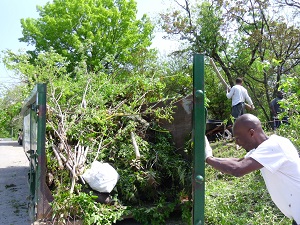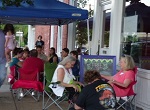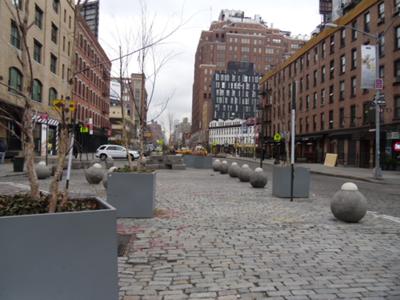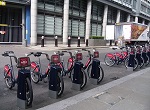Community Improvement Projects Boost Enthuasism
Last Updated: September 23, 2025
Check out these potential community improvement projects. They range from small steps such as establishing a community garden to major large park cleanup and stream cleanup projects, which nonetheless could be spearheaded by one neighborhood.
Many of you will want to see the long list of projects implied on the community development ideas page. Periodically these rotate to give you a completely new list of thought starters.

If you don't find anything that tickles your fancy here or on the ideas page, go over to the sitemap and use the yellow box near the top to find a different way of sorting the website pages based on your role and the type of community.
On the home page we talked about how much fun community development and community improvement projects can be. That little note of optimism and realistic hope is important there, but it is equally true that working on your community can be frustrating, slow, and tedious.
Often it feels as though you take one step ahead and then some other problem pops up. It is a fortunate neighborhood indeed where there is only one subject that needs attention, and where people have both the will, legal permission and mechanisms, and the money to fix it promptly. By the way, those fortunate few are most welcome to contribute here as well.
Commonly the cleanups and the special events to promote your town and your businesses need to continue on a periodic basis, with no end in sight. Learning how to plan and execute those events as smoothly as possible is an effective use of your time.
In the photo links above, we didn't even include those one-time events that might become annual or recurring events as well. For instance, we have written about neighborhood tours and neighborhood parades, each of which can be potent in raising the profile of your community.
Three Tips Applying to Almost All Community Improvement Projects
It surprises us how often people forget or ignore these simple truths.
1. Address something that enough people see as a need. Too many requests for help will generate volunteer burnout if there are only a few helpers who reliably participate in your community improvement projects. Many needs might not be obvious to most residents, especially if it is a social need or something that pertains to a hidden corner of the neighborhood or powerless part of the population. The test is whether people are eager to help when the issue is explained in just a sentence or two. If not, reframe the problem statement, move on to a different topic, or prepare to create change all by yourself. If you see something as a clear need, and your community does not respond, perhaps you need to create an educational campaign as a starting point.
You can safely violate this tip only when your community organization is so strong and vital that it can adopt more than one major project at a time. In that case, one or more initiatives that are less obvious to average community members can be undertaken.
2. Take the time to plan a community betterment course of action that is likely to lead to success. Wishful thinking is the enemy of accomplishment in neighborhood activity. For example, to want a grocery store does not make it viable to have one. While convenient places to buy healthy food is important to a community for many reasons, working toward an intermediate step will result in greater momentum and optimism within your community than stubbornly sticking to a goal that is unlikely to be attained. In this example, a farmer's market, mobile grocery truck, produce stand, or delivery service can be a much more practical goal than a full-service grocery store.
Organizations that are strong enough to mount more than one major project at a time can feel free to violate this rule of thumb, as long as their list of attainable goals is strong.
3. For one-time community improvement projects, usually you must only answer test 1 above. However, if the idea will require sustained effort, take the time to build a formal or informal organization, committee, or small group that will dedicate itself to the task. Usually your progress will not be linear, which means making community progress in a straight line. People need enough passion to stay with you if you do not meet with immediate success and if things don't go exactly as planned.
If you don't have experiences to share with others yet, and you need more inspiration about possible projects, head over to our community development ideas page where we describe 21 potential projects.
Share Your Own Creativity in Finding Community Solutions
On this page, we introduce both community improvement projects that we recommend and descriptions of their own efforts from our website's visitors. Many who read our pages are deeply involved in community improvement
projects. Some of you are consultants who want to tout a successful
community betterment undertaking, and others are simply passionate about
your particular success, hope, or instructive failure of a
neighborhood, block, or citywide initiative.
Most of the stories of what works and what fails in community development are lost to others who are trying to address a similar issue or opportunity. That is why it would be so helpful for those who work in neighborhood organizations, block units, community development corporations, or in city planning, economic development, or sustainability consulting to get busy giving us more case studies and short anecdotes about what is happening in community building around the world.
Among other things, creativity comes about when two disparate ideas come together, sparking something new for you. Below you will find a form where you can write about your community improvement project and send us photos. If you submit something understandable at all, it will be published as a separate page on this website. I hope that through your contributions, we actually add to the knowledge base about how to make community improvement projects ever more successful and interesting. I edit only for clarity. Any comments people want to add are moderated.
Thanks for helping out other neighborhood volunteers and even professionals who are having trouble coming up with a great idea.
Please Tell Us about Your Community Project, Idea, or Experience
Please let us know what worked and what didn't work as a betterment project. Understand that a project might be a task easily accomplished in a morning or a years-long activity. You can also write about opportunities, issues, and policy propsals to your heart's content! The result is a web page, with comments possible.
- Making and Keeping a Good Community > Community Improvement Projects
Join GOOD COMMUNITY PLUS, which provides you monthly with short features and tips about timely topics for neighborhoods, towns and cities, community organizations, and rural or small town environments. Unsubscribe any time. We expect to send just one more issue before we abandon this website and move to other projects. Sign up to see our final words of wisdom.












